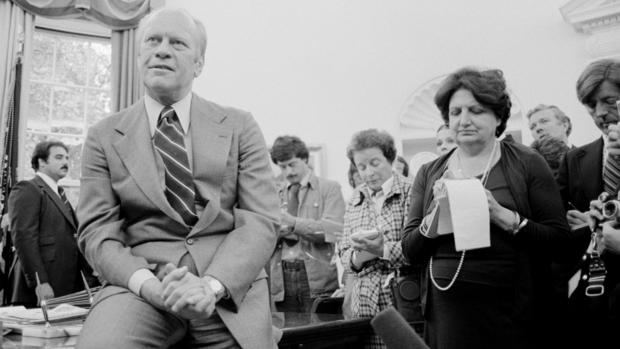Remembering Helen Thomas
(CBS News) I worked with Helen Thomas for 11 years and I'm proud that I did.
When I went to work with United Press International in 1971, Helen was already a White House celebrity. Her "Backstairs at the White House" column was one of the most widely-read offerings that UPI sent to its subscribers. Her shouted "Thank you" at the end of press conferences was a staple of life at the Executive Mansion.
Wire service reporters back then were mostly nameless scribes. Not Helen.
Presidents deferred to her, joked with her, respected her, and at times feared her.
As a young "dictationist," it was my job back then to type down whatever Helen and the other reporters phoned into the UPI bureau in Washington. This was before cell phones, computers, etc. We had typewriters, of course, and we used them all day, every day.
Nonetheless, my typing skills were atrocious. Helen's unedited prose was a tad scrambled. Sometimes the people she interviewed were a bit scrambled as well. The late Martha Mitchell was an on-the-record source of Helen's for a good portion of Watergate scandal information. Martha trusted Helen as a fair channel for her outrage, especially her contention that her husband, former Attorney General John Mitchell, was being railroaded by President Nixon's aides.
Occasionally, Mrs. Mitchell called the bureau, asking, "Where's Helen?" Occasionally I took those calls. And occasionally Mrs. Mitchell was, well, inebriated. No problem for Helen, as she "distilled" Martha's information into a running narrative of wrongdoing by the Nixon White House.
I remember another time during the Carter presidency, I was asked to fill in at the White House while Helen wrote her column. This was a big deal for me. It turned out to be something of a ruse, though; the White House press corps arranged to surprise Helen that day -- her birthday -- with a huge cake. It was my job to keep her away from the briefing room until the cake was wheeled in.
President Carter showed up to officiate at the party, and Helen immediately asked him some pugnacious policy question. Helen was not sentimental when it came to her job.
Carter -- in the midst of his "malaise" period -- had just let a number of his Cabinet members go. After she got the answer she wanted, Helen looked around at the cake and the reporters and asked, where were the knives to cut the cake?
"We used them all on the Cabinet," Carter deadpanned.
Somehow my awful typing and her run-on sentences meshed into terrific stories about the presidency. Editors, of course, helped fashion her work into gold.
By 1981, I was working side-by-side with Helen as a White House correspondent in UPI's small cubicle off the briefing room. To give you an idea of her time span at the White House, she covered the Eisenhower administration first.
Helen was the most dogged reporter I ever met. She was relentless on the telephone and in person. Once she was on the scent of a story, it was good to just get out of the way. I think she had a permanent crease in her right shoulder where her tape recorder rested for much of the day.
Back then, Air Force One was a rather cramped Boeing 737. And the truth is, a lot of reporters preferred the more convivial press plane than the presidential aircraft. I know I did.
Helen always wanted to ride Air Force One. It was the plane the president was riding, and why would she want to be on any other plane with a bunch of half-soused reporters?
Others may disagree, but I think Helen was really the first female reporter the White House ever took as seriously as her male counterparts. And as much of a bulldog as she was, I remember how kind and thoughtful she was, too.
She was always willing to help a young reporter through the thicket of White House press releases and pronouncements. Helen was hugely popular with most of her colleagues. I say most, because our friends -- and direct competitors -- at the Associated Press would not have objected had Helen taken a little time off now and again.
She almost never did.
She had a retinue of Lebanese friends who would accompany her regularly from the White House to the dark corners of the Calvert Cafe in Northwest Washington. It was something of a Middle Eastern salon.
And, yes, Helen had a blind spot when it came to Israel. The daughter of Lebanese immigrants, Helen was not shy about expressing her point of view when she thought the Israelis were in the wrong.
A few years ago, in her 80s, she was asked an ambush question by a propagandist with a camera at the White House one day, and blurted out feelings about the Israeli-Palestinian conflict.
I did not agree with her on the Middle East; I thought she was mistaken and short-sighted. But a lifetime of great work should not be overshadowed by a comment made at an advanced age. Cut her some slack.
And the truth is, whatever bias she may have had, it did not make its way into her stories. As I said, editors were helpful in steering her off the shoals.
And on so many other stories involving so many presidents, Helen was insightful, engaging, and slam-dunk right.
It was an honor to work with her.
I will miss her. A lot.
